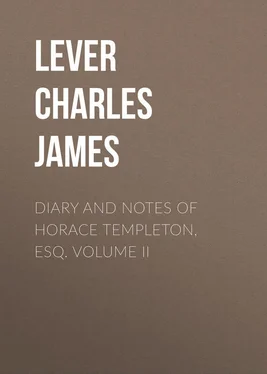Charles Lever - Diary And Notes Of Horace Templeton, Esq. Volume II
Здесь есть возможность читать онлайн «Charles Lever - Diary And Notes Of Horace Templeton, Esq. Volume II» — ознакомительный отрывок электронной книги совершенно бесплатно, а после прочтения отрывка купить полную версию. В некоторых случаях можно слушать аудио, скачать через торрент в формате fb2 и присутствует краткое содержание. Жанр: literature_19, foreign_antique, foreign_prose, на английском языке. Описание произведения, (предисловие) а так же отзывы посетителей доступны на портале библиотеки ЛибКат.
- Название:Diary And Notes Of Horace Templeton, Esq. Volume II
- Автор:
- Жанр:
- Год:неизвестен
- ISBN:нет данных
- Рейтинг книги:5 / 5. Голосов: 1
-
Избранное:Добавить в избранное
- Отзывы:
-
Ваша оценка:
- 100
- 1
- 2
- 3
- 4
- 5
Diary And Notes Of Horace Templeton, Esq. Volume II: краткое содержание, описание и аннотация
Предлагаем к чтению аннотацию, описание, краткое содержание или предисловие (зависит от того, что написал сам автор книги «Diary And Notes Of Horace Templeton, Esq. Volume II»). Если вы не нашли необходимую информацию о книге — напишите в комментариях, мы постараемся отыскать её.
Diary And Notes Of Horace Templeton, Esq. Volume II — читать онлайн ознакомительный отрывок
Ниже представлен текст книги, разбитый по страницам. Система сохранения места последней прочитанной страницы, позволяет с удобством читать онлайн бесплатно книгу «Diary And Notes Of Horace Templeton, Esq. Volume II», без необходимости каждый раз заново искать на чём Вы остановились. Поставьте закладку, и сможете в любой момент перейти на страницу, на которой закончили чтение.
Интервал:
Закладка:
Charles James Lever
Diary And Notes Of Horace Templeton, Esq. Volume II (of II)
CHAPTER I
The Ortl’er is the Mont Blanc of the Tyrol, and seen from Nauders, a village on a green, grassy table land, more than four thousand feet above the sea, can well bear comparison with the boldest of the Swiss Alps. Nauders itself, a type of a Tyroler village, is situated in a wild and lonely region; it has all the picturesque elegance and neat detail of which Tyrolers are so lavish in their houses, and, like every other Dorf in this country, has its proud castle standing sentry over it. The Barons of the Naudersberg were men of station in olden times, and exacted a tribute over a tract extending deep into the Engadine; and now, in this great hall, whose chimney would contain the heaviest diligence that ever waddled over the Arlberg, a few Nauders notabilities are squabbling over some mysterious passage in a despatch from Vienna, for it is the high court of the district, while I wait patiently without for some formality of my passport. To judge from their grave expressions and their anxious glances towards me, one would say that I was some dangerous or suspected personage – some one whose dark designs the government had already fathomed, and were bent on thwarting. If they did but know how few are, in all likelihood, the days I have yet to linger on, they would not rob me of one hour of them in this wild mountain.
And yet I have learned something while I wait. This little dorf, Nauders, is the birthplace of a very remarkable man, although one whose humble name, Bartholomew Kleinhaus, is little known beyond Tyrol. Left an orphan at five years old, he lost his sight in the small-pox, and was taken into the house of a carpenter who compassionated his sad condition. Here he endeavoured to learn something of his protector’s trade; but soon relinquishing the effort, he set to work, forming little images in wood, at first from models, and then self-designed, till, at the age of thirteen, he completed a crucifix of singular beauty and elegance.
Following up the inspiration, he now laboured assiduously at his new craft, and made figures of various saints and holy personages, for his mind was entirely imbued with a feeling of religious fervour; and to such an extent that, in order to speak his devotion by another sense, he actually learned to play the organ, and with such a proficiency, that he performed the duties of organist for nearly a year in the village church of Kaltenbrunnen. As sculptor, his repute is widely spread and great in Tyrol. A St. Francis by his hand is at present in the Ambras collection at Vienna; many of his statues adorn the episcopal palaces of Chur and Brixen, and the various churches throughout the province.
Leaving the sculptor and his birthplace, which already a mountain mist is shrouding, I hasten on, for my passport is at last discovered to be in order, and I am free to pursue my road to Meran.
Of all spots in the Tyrol, none can compare with Merah, the wildest character of mountain uniting with a profusion of all that vegetation can bring. The snow peak, the glacier, the oak forest, the waving fields of yellow corn, the valley, one vast vineyard – where have such elements of grandeur and simple beauty in scenery been so gloriously commingled? And then the little town itself – what a strange reminiscence of long-buried years! The street – there is properly but one – with its deep arched passages, within which the quaint old shops, without windows, display their wares; and the courtyards, galleried around, story above story, and covered at top by a great awning to keep off the sun; for already Italy is near, and the odour of the magnolia and oleander is felt from afar.
I wandered into one of these courts last night; the twilight was closing, and there was a strange, mysterious effect in the dim distances upwards, where figures came and went along the high-perched galleries. Beyond the court lay a garden, covered over with a vine-roofed trellis, under whose shade various tables were placed. A single light, here and there, shewed where one or two guests were seated; but all so still and silently, that one would have thought the place deserted. It seemed as if the great charm was that mellow air softened by silence, for none spoke.
I walked for some time through the alleys, and at last sat down to rest myself at a little table, over which a wide-leaved fig-tree spread its dark canopy.
At first I did not remark that another person was seated near the table; but as my eyes became more accustomed to the shade, I descried a figure opposite to me, and immediately rising, I offered my apology in German for intruding. He replied in French, by politely requesting I would be seated; and the tone and manner of his words induced me to comply.
We soon fell into conversation; and although I could barely distinguish his shadow as the night fell thicker, I recognised that he was an old man; his accent proclaimed him to be French. We chatted away, the topics ranging, with that wilfulness conversation always inclines to, from the “Wein-cur “ – the “Grape cure” – for which Meran is celebrated, to the present condition and the past grandeur of the ancient town. With its bygone history my companion seemed well acquainted, and narrated with considerable skill some of its illustrious passages, concluding one by saying, “Here, in this very garden, on a summer morning of 1342, the Emperor and the Margrave of Brandenburg sat at breakfast, when a herald came to announce the advance of the procession with the future bride of the Duke, Margaretta, while the Bishops of Augsburg and Regensberg, and all the chivalry of the Tyrol, rode beside and around her. In yonder little chapel, where a light now glitters over a shrine, was the betrothal performed. From that day forth Tyrol was Austrian. Of all this gorgeous festivity, nothing remains but an iron horse-shoe nailed to the chapel door. The priest who performed the betrothal somewhat indiscreetly suggested that, with such a dowry as the bridegroom received, he might well be generous towards the Church; on which the Duke, a man of immense personal strength, at once stooped down and wrenched a fore-shoe from the bride’s white palfrey, saying, with sarcastic bitterness, ‘Here, I give thee iron for stone!’ in allusion to the rocks and precipices of the Tyrol land.
“Ungratefully spoken at the time,” continued the stranger, “and equally false as a prophecy. These wild fastnesses have proved the best and last defences of that same Austrian Empire. Indeed, so well aware was Napoleon of the united strength and resources of the Tyrol, that one of his first measures was to partition the country between Bavaria, Austria, and Illyria. And yet this Tyrol loyalty is inexplicable. They are attached to the house of Haps-burgh, but they are not Austrian in feeling. The friends of free trade need not go far in Meran to find disciples to their doctrine. Every one remembers the time that an aume of Meraner wine was worth seventy-five gulden, which now is to be had for five; but then they were Bavarian, and might barter the grape-juice for the yellow produce of the Baierisch corn-fields. At the present day they are isolated, shut up, and imprisoned by custom-houses and toll; and they are growing daily poorer, and neglecting the only source they possessed of wealth.”
We talked of Hofer, and I perceived that my companion was strongly imbued with an opinion, now very general in the Tyrol, that his merits were much less than foreigners usually ascribe to him. Sprung from the people, the host of a little wayside inn, a man with little education, and of the very roughest manner, it is somewhat singular that his claims are most disputed among the very class he came from. Had he been an aristocrat, in all likelihood they had never ventured to canvass the merits they now so mercilessly arraign. They judge of his efforts by the most unfair of tests in such matters – the result. They say, “To what end has Tyrol fought and bled? Are we better, or richer, or freer than before?” They even go further, and accuse him of exciting the revolt as a means of escaping the payment of his debts, which assuredly were considerable. What a terrible price is paid for mob popularity, when the hour of its effervescence is past!
Читать дальшеИнтервал:
Закладка:
Похожие книги на «Diary And Notes Of Horace Templeton, Esq. Volume II»
Представляем Вашему вниманию похожие книги на «Diary And Notes Of Horace Templeton, Esq. Volume II» списком для выбора. Мы отобрали схожую по названию и смыслу литературу в надежде предоставить читателям больше вариантов отыскать новые, интересные, ещё непрочитанные произведения.
Обсуждение, отзывы о книге «Diary And Notes Of Horace Templeton, Esq. Volume II» и просто собственные мнения читателей. Оставьте ваши комментарии, напишите, что Вы думаете о произведении, его смысле или главных героях. Укажите что конкретно понравилось, а что нет, и почему Вы так считаете.












